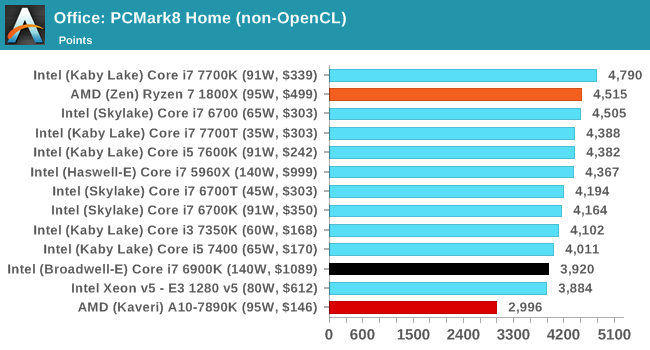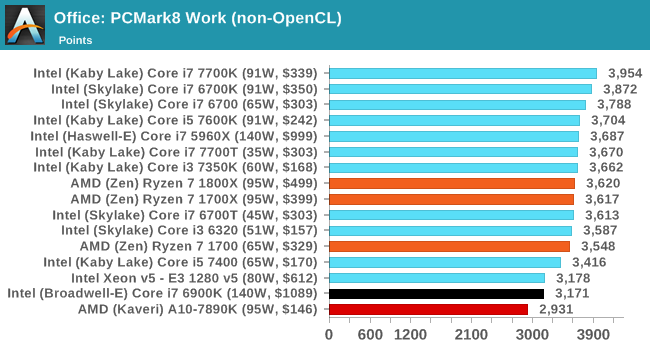The AMD Zen and Ryzen 7 Review: A Deep Dive on 1800X, 1700X and 1700
by Ian Cutress on March 2, 2017 9:00 AM ESTBenchmarking Performance: CPU Office Tests
The office programs we use for benchmarking aren't specific programs per-se, but industry standard tests that hold weight with professionals. The goal of these tests is to use an array of software and techniques that a typical office user might encounter, such as video conferencing, document editing, architectural modelling, and so on and so forth. At present we have two such tools to use.
PCMark8
Despite originally coming out in 2008/2009, Futuremark has maintained PCMark8 to remain relevant in 2017. On the scale of complicated tasks, PCMark focuses more on the low-to-mid range of professional workloads, making it a good indicator for what people consider 'office' work. We run the benchmark from the commandline in 'conventional' mode, meaning C++ over OpenCL, to remove the graphics card from the equation and focus purely on the CPU. PCMark8 offers Home, Work and Creative workloads, with some software tests shared and others unique to each benchmark set. The Creative workload unfortunately seems to fail from the commandline, as the graphical test gives an output of zero (update 3/8: we've found a way around this; will update when we get CPUs retested).


Addendum on 3/8: Originally we posted PCM8 Home scores for Ryzen that were around 3800. On further inspection, these runs were misconfigured due to circumstances beyond our control, and test data is being re-run. The Ryzen 7 1800X in this instance scores 4515.
SYSmark 2014
SYSmark is developed by Bapco, a consortium of industry CPU companies. The goal of SYSmark is to take stripped down versions of popular software, such as Photoshop and Onenote, and measure how long it takes to process certain tasks within that software. The end result is a score for each of the three segments (Office, Media, Data) as well as an overall score. Here a reference system (Core i3-4130, 4GB DRAM, 500GB HDD) is used to provide a baseline score of 1000. A newer version of the benchmark (2014 SE) will be used in future reviews.
A note on contect for these numbers. AMD left Bapco in the last two years, due to differences of opinion on how the benchmarking suites were angled towards Intel processors and had optimizations to show bigger differences than what AMD felt was present. The following benchmarks are provided as data, but the conflict of opinion between the two companies on the validity of the benchmark is provided as context for the following numbers.














574 Comments
View All Comments
Meteor2 - Friday, March 3, 2017 - link
...In which case you'd be better off with a 7700K, looking at the benchmark results. Cheaper too.ddriver - Thursday, March 2, 2017 - link
Ryzen offers the same performance at half the cost. More pci-e lanes is good for io, however quad channel memory is pretty much pointless, aside of pointless synthetic benches. Ryzen might not make it to my personal workstation due to the low pci-e lane count, but it has enough to replace my aging 3770k farm nodes, to which it will be a significant upgrade, provided the chip and platform turn out to be stable and bug free,Intel has gotten lazy and sloppy, bricking products, chipset bugs, they haven't really done anything new architecture wise for years, milking the same old cow.
It is rather silly to assume that gaming dictates CPU prices, this IS NOT a gaming product, if your ass-logic is to be followed, the intel needs to drop the 7700k price to 168, because in games it is barely any faster than the i3-7350K, and has the same pathetic, even lower than ryzen, number of pci-e lanes.
This is a chip for HPC, which gaming is NOT. Go back to the kiddie garden, eight core chips are for grown ups ;)
imaheadcase - Thursday, March 2, 2017 - link
People compare it to gaming, because its the main driving for these type of CPUs, its not even gaming specfic but VR, Graphics modeling, etc. You honestly think people are buying these for offices or industry for complex math problems? lolddriver - Thursday, March 2, 2017 - link
It is not "people" but "fanboys", and they cling to gaming because it is the only workload where intel can offer better performance for the price, albeit by comparing products from different tiers, which is quite frankly moronic.Cars are faster than trucks, so who in the world needs to spend money on trucks? That's the kind of retarded logic you are advocating...
Smart people buy whatever suits their needs. Obviously, if all you do is play games you wouldn't be buying ryzen or a lga2011 system. Just get an unlocked i5 and overclock it, best bang for the buck. You must realize that even if you don't, other people use computers for tasks other than gaming. And for a large portion of them ryzen will be the best deal, because it is versatile - it is good enough for gaming too, while still offering significant performance advantage compare to an intel quad in tasks that are time staking, and are very much competitive with intel's 8 and 10 core chips while delivering more than twice the value, which is important for everyone who doesn't have money to throw away.
Claiming that "gaming is the main driving for these type of CPUs" is foolish to say the least, because games don't benefit from that particular type of CPUs. Most of the games can't even property utilize 4 threads. And this is not likely to change soon, because the overhead of complexity and thread synchronization is not worth it for non-performance demanding tasks such as games.
Lord-Bryan - Thursday, March 2, 2017 - link
That's one really well thought out argumentrarson - Thursday, March 2, 2017 - link
Ryzen's versatility and price are the two biggest factors that make it so good. It might not beat the very best gaming CPU that Intel has, or the very best multi-threaded monster that Intel has in every scenario, but it's competitive with both at half the price of the high-end stuff. Hence, while I do game some and want to build a computer to use for gaming, I also do other stuff like audio production that benefits greatly from Ryzen's multi-threaded performance. To me, it's a no-brainer: Ryzen right now is the best bang-for-the-buck chip for someone who wants all-around high-end performance, by far. Maybe not the 1800X, I kind of think the 1700X is a better value, but still, for most people who want multiple-use performance instead of absolute maximum gaming performance, Ryzen is the clear choice.Ryzen's max clock speeds seem, like Intel's, to be hindered by the total number of cores on chip, so it should be extremely interesting to see how the 4- and 6-core chips overclock once they arrive, and what kind of performance they'll achieve. I actually think that, like Intel, a 4-core Ryzen might be a better gaming chip than the 8-core, and if that's the case, then it might be really darn close to Intel's best Kaby Lake, because like you pointed out, most games aren't threaded well at all.
Additionally, from a gaming perspective, it seems like AMD has done more to push technology forward in that respect than anyone else. They've worked on Mantle, Vulkan, FreeSync, TrueAudio, and others. They've always tried to give performance value by offering more cores, but software has been slow to take advantage of them. Intel is content to stagnate by offering extremely incremental increases because performance is "good enough" so developers have no reason to really try to take advantage of extra cores aside from outside use cases. With Ryzen, AMD is pushing chips towards higher core counts (much like they did with the Athlon X2) but this time, they're trying harder to get developers on board and help them achieve good results. So while it always takes forever for software to better utilize the hardware, once the hardware becomes more common the software will start to follow and you'll see the actual gaming performance improve. Is that a valid reason to buy Ryzen today if your sole focus is gaming? Of course not, but it does bode well for Ryzen owners in the future. The performance can only get better. Can the same be said about Intel? Well, probably not if you're using one of the 4-core chips. It's pretty much a known quantity.
I had high hopes for Bulldozer and Ryzen is the exact opposite of what Bulldozer was. I feel like the CPU market has been stagnant for years and now suddenly there's a reason to be excited. This makes AMD competitive again, which will be good for pricing even if you're an Intel fan. It's been a long wait, but it was worth it, this is a good product.
Notmyusualid - Friday, March 3, 2017 - link
http://www.gamersnexus.net/hwreviews/2822-amd-ryze...Makaveli - Thursday, March 2, 2017 - link
+1 ddriver you destroyed that kid with your logic well done.khanikun - Friday, March 3, 2017 - link
Gaming definitely isn't the main driving force for CPUs, as use case changes. I bought a 7700K for my gaming rig. I'd get a 1700 for a VM host, as I'd like to start building a lab again. It won't be this round though. I'd rather wait for AMD to iron our any kinks and buy the next generation. It's something the 7700K could do, but more cores would definitely make it a much better lab.Meteor2 - Friday, March 3, 2017 - link
Nobody buys mid/high-end consumer chips for HPC. They buy them for gaming. A few for video production. That's it.